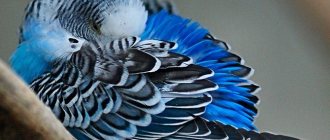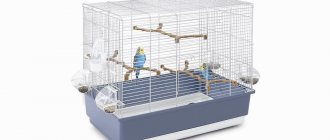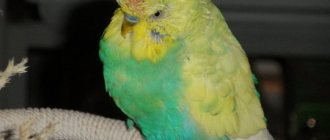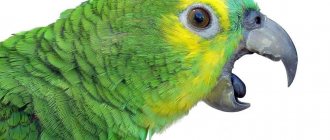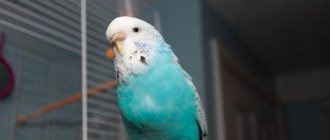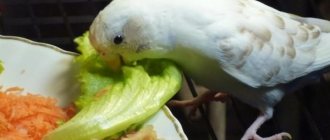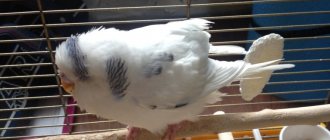The lion's share of budgerigar diseases is a consequence of improper maintenance, insufficient care, and poor nutrition. Signs of illness in a budgie can be determined for some visual reasons. The usually cheerful, restless, never-silent and curious creature suddenly becomes lethargic, sits ruffled on a perch for hours, and shows no interest in either new objects or food. The plumage also reacts quite quickly to the condition of its owner, becoming dull and unkempt. The parrot does not chirp, does not bathe, and constantly sleeps in an unusual position for it.
How long do parrots sleep in natural conditions?
The life of birds in natural conditions and in captivity is different in many ways. To understand this difference, first of all, consider the duration of their sleep in freedom.
Parrots are native to mainland Australia. Its territory experiences a very hot climate. Such conditions forced the birds to take a daytime siesta. By noon, the temperature rises so much that being in the sun becomes life-threatening. That's why birds hide in the shadows. This time is a great opportunity for them to sleep and relax.
Feeling their roots, birds today often prefer daytime naps even in apartments. Instincts continue to operate, so feathered pets are awake for exactly the period of time that is equal to the standing of the sun. Approximately 10-14 hours.
How long should parrots sleep at home?
Living in an apartment is very different from living in your home country. Here the “daylight hours” are regulated by the breeder. For example, today you can turn off the lights and go to bed at 20:00, tomorrow at 23:00. The parrot is not interested in your affairs and concerns. For him, the main thing is to adhere to the regime, and such an erratic duration of “daylight hours” can negatively affect his health.
If the parrot is lethargic and sleeps, perhaps the reason is just a violation of the sleep-wake pattern. The norm for a feathered pet in winter is up to 14 hours, in summer – up to 12 hours.
Video “Diseases of parrots. Symptoms and treatment"
This video talks about why parrots get sick, how to diagnose the disease and cure it.
Was this article helpful?
Thank you for your opinion!
The article was useful. Please share the information with your friends.
Yes (100.00%)
No
X
Please write what is wrong and leave recommendations on the article
Cancel reply
Rate the benefit of the article: Rate the author ( 8 votes, average: 4.75 out of 5)
Discuss the article:
Why does a parrot sleep all day: reasons
The question of why the parrot sleeps all the time began to worry when these birds began not only to switch to home keeping, but also to change their continent. But, despite this, the instincts that appeared in their historical homeland remained.
In the natural environment in Australia, such cute birds were constantly cared for. Just imagine how much effort it took to get not only food for yourself, but also for your offspring. Life was further complicated by the constant struggle with enemies who regularly tried to attack. And even this busy schedule did not interfere with making time for proper sleep.
In Australia, it is unbearably hot every day for several hours. At this time, the birds hide in the shade of trees and sleep. The budgerigar behaves in exactly the same way.
These instincts also manifest themselves at home. A feathered pet can take a nap in the middle of the day, and there is nothing wrong with that. The parrot naturally sleeps a lot, thanks to its instincts. Although there are other reasons why a parrot constantly sleeps and crows.
How much food should a wavy eat per day?
For most pet parrots, a significant portion of their food consists of grain mixtures. On average, one bird eats no more than 2 teaspoons of such food per day. Some breeders immediately pour the entire daily requirement into the pet’s feeder. This saves them time, but can lead to overuse of feed mixtures.
Budgerigars do not have the habit of “filling their tummy” when they are already full. But birds are quite capable of staining all the food with husks or excrement. To avoid the need to replace the entire daily portion of food with a new one, experts advise dividing the daily amount of food for parrots into several parts.
Important! For large breeds of birds, the daily feed requirement is approximately 35–40 g.
If the parrot is healthy, he will not only eat the usual amount of food, but will also not refuse his favorite treat. It is important that there is always drinking water in the bird’s home. This helps the wavy fish regulate the rate of digestion. The drinking bowl is washed and the water in it is renewed daily.
Interesting! Vegetable and fruit nutrition for budgies, as a rule, is not limited. Such products are offered to birds in the form of small pieces that are cleared of seeds and outer skin.
Why does the parrot constantly sleep: disease
According to veterinarians, excessive sleepiness may indicate poor nutrition or a cold. Experts associate it with liver disease, poisoning, poor nutrition, and so on.
If your budgie is constantly sleeping, and you attribute this to some kind of disorder, veterinarians suggest the following actions:
- Review the status of your pet's litter. Diarrhea indicates a poor diet. In this case, experts advise purchasing an antibiotic for animals. For example, the drug Baytril is suitable for treatment.
- As an additional source of calcium, there must always be a mineral stone in the cell. In addition, the pet will grind its beak on it. For a parrot, a cuttlefish shell or a chalk-like stone would be an excellent choice (it does not come with vitamin supplements, salts or dyes).
- If the fact that the parrot sleeps all the time is associated with liver disease, veterinarians recommend the drug Hepatofite or Gapetoform. To support the liver, it should be taken for 10 days, ¼ tablet 2 times a day.
- You should definitely include greens, vegetables and fruits in your poultry’s diet.
The fact that a budgerigar sleeps all the time does not mean that there are any violations. In addition to drowsiness, there should be other symptoms of disease: frizz, poor appetite, frustration, vomiting, and more. If they are present, you need to seek help from an ornithologist.
Other cases when a parrot sleeps often indicates the health of the pet. All experts say that they need and benefit from a daytime siesta.
Poisoning
The decrease in activity occurs as a result of poisoning - the parrot may swallow something dangerous or inhale toxic fumes. Parrots are very curious, they strive to bite and try surrounding objects. You cannot leave your pet unattended during a walk, otherwise he will definitely get into trouble. A poisoned parrot quickly loses strength, sinks to the bottom of the cage and sits with its eyes closed, ruffled, not reacting to external stimuli.
Poisoning in a parrot
The risk of household poisoning contains:
- Medicines. A parrot may mistake bright capsules or tablets lying on the table for a treat.
- Houseplants. Among them there are specimens that are poisonous not only to birds, but also to humans. For example, ivy, dieffenbachia, azalea. Some poison the air, others are dangerous if swallowed, and parrots just love to pinch grass.
- Liquids. A bird can drink from glasses or containers left uncovered: alcoholic drinks, vinegar, coffee, various marinades.
- Aerosols. In high concentrations, perfumes and air fresheners are harmful to parrots. The same list can include fumes from heated Teflon cookware.
- Newspapers magazines. Parrots love to tear paper into pieces and even swallow it. Blank paper is completely harmless, but the same cannot be said about newspapers - the chemicals in printing ink are very toxic.
- Products prohibited for feeding parrots. Often, owners themselves poison their pets when they offer them food from their plate.
Note! A parrot can become poisoned when it chews on a low-quality toy. Pieces of plastic entering the stomach begin to release toxins into the body.
In the best case, the bird experiences a mild intestinal upset after poisoning and recovers quickly. Severe toxic damage deprives the bird of strength and will to live. This is accompanied by such striking symptoms as diarrhea, vomiting, and cramps. An exhausted parrot lies at the bottom of the cage and trembles. If you do not provide assistance to your ward in a timely manner, he will die.
Why does a budgie sleep all day: incompatibility with the breeder's regime
For a parrot to feel great, it needs to get enough sleep. Therefore, you need to periodically check how much the parrot sleeps and eats.
Another thing is that difficulties may arise here, because the human regime often does not coincide with the bird’s regime. In this case, in order not to harm your pet with insomnia, you can use a blanket. When you cover the cage with it, the parrot begins to doze. He associates darkness with rest and sleep, but the fabric of the bedspread should be thin and breathable.
Psychological factor
Oddly enough, the cause of lethargy without the above symptoms may be the appearance of stress in a parrot. A highly organized nervous system in the process of evolution allowed the bird to develop sense organs and endow it with good memory. When artificially bred and kept, a bird can become very attached to its owner. Her favorite cage and toy become an integral part of her life. Drastic changes in the life of a bird often lead to severe stress. Depression can occur due to separation from your partner.
A parrot sleeps all day: how to organize a normal sleep schedule
To normalize your feathered pet's sleep patterns, take into account the summer and winter seasons. In the warm season, the sun stays at its zenith for a long time. And if you usually wake up at 7 o'clock in the morning, you need to cover the cage with a blanket at 21 o'clock in the evening. Then the parrot will sleep for the required 10 hours.
In winter, a parrot can sleep longer. Since it gets dark outside the window earlier, the cage can be covered as early as 5 pm. If you wake up at 7 am, he will sleep for 14 hours. This time is enough for the bird to be cheerful and cheerful throughout the day.
Remember that if your budgie sleeps a lot, this does not always indicate illness. Perhaps his regime should simply be adjusted.
Desire to breed
Owners of ornamental birds sometimes observe strange behavior in their charges: the parrot sits for a long time at the bottom of the cage in the corner, and then shakes itself off and flies up onto a perch. You can't tell from his appearance that there is any cause for concern. Such actions suggest the idea: the parrot is preparing for procreation.
Pregnant parrot
If a different-sex couple lives in a cage, it is quite possible that this is how the beginning of nesting manifests itself. It is recommended to support the instincts of pets: set up a nest box for them. But if the only inhabitant in your home’s living area is a female parrot, you need to suppress her desire for offspring. You should remove the mirror, twigs, and paper from the cage. There should be no materials inside from which the bird could build a nest. False incubation must be stopped, otherwise the parrot will lose its health in vain.
